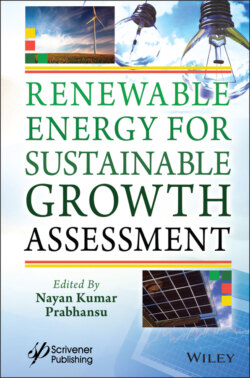Читать книгу Renewable Energy for Sustainable Growth Assessment - Группа авторов - Страница 49
2.1 Introduction
ОглавлениеFossil fuels-based generation contributes the maximum towards electricity generation in most parts of the world [1]. The increased use of energy from fossil fuels is the major cause of the environmental problem which the world is facing today. To improve the environmental conditions along with economic and social development, both developed and developing countries have already initiated the adoption of suitable energy systems to achieve sustainable development. Development is not possible without energy and sustainable development is not possible without sustainable energy. Thus, it becomes important that the sustainable energy system should be efficient and at the same time limit emissions.
Global warming as a result of increased greenhouse gas (GHG) emissions from fossil fuel-based generation has led the world to gradually switch to renewable energy (RE) based generation. RE sources e.g., wind, solar, hydropower, ocean, geothermal, biomass, etc., have been recognized as a key player in reducing GHG emissions and a path towards a sustainable future [2]. Today one of the most important goals towards achieving sustainability is the transformation to an RE-based economy [3]. However, there are various factors that help to attain sustainable development. For example, the energy sources should be readily available in the long term, should be efficient, and should not cause any form of social impacts while they are being utilized [2].
India along with many other countries has already taken many initiatives to develop and promote RE-based generation [4]. The regular increasing energy demand in India is met by both commercial and RE sources. In India, the RE supports the government in meeting the country’s three important energy policy objectives, i.e., energy access, energy security, and climate change mitigation, along with reducing dependency on the importing of fossil fuels [5, 6].
RE sources are inexhaustible, environmentally friendly, have zero fuel cost except for bioenergy, and help in local development by creating employment opportunities. At the same time, RE has high installation costs, intermittent sources (solar and wind), and environmental and social impacts in the form of landscape alteration, deforestation, loss of biodiversity, displacement of people, etc. [7–12]. Sustainability in energy systems refers to economic development along with protecting the environment and society. Sustainability dominants as one of growth, while assessing the energy. Hence for a sustainable future, it becomes important to assess the sustainability of RE technologies before any decision-making in regard to energy planning at the national level.
Sustainability assessment of RE technologies at a national scale involves a range of conflicting technological, economic, environmental, and economic indicators. Multicriteria decision-making (MCDM) methods are the best tool that can address these conflicts and choose the most suitable alternative from the pool of many alternatives. In the present study, the indicators such as response to peak demand, social acceptability, environmental risks, and social risks are accessed qualitatively. These qualitative data are generally associated with uncertainties and a fuzzy approach is the best to address these uncertainties. Further, it has been reviewed that sustainability indicators’ values vary widely for each RE technology and there is a great possibility of uncertainties for all input values.
As far as the sustainability assessment of RE technologies in the context of India is considered there are limited studies done [13, 14]. However, neither of these studies have addressed any form of uncertainties associated with input data. Thus, this study aims to address these uncertainties of input data in two ways. Firstly, the RE technologies in the context of India were assessed and ranked using fuzzy-TOPSIS (a technique for order of preference by similarity to ideal solution) to address the uncertainties associated with qualitative data. Secondly, to deal with the uncertainties link with a wide range in input values, the TOPSIS method is run using Monte Carlo simulation (MCS) and probabilistic ranking is obtained. Further, both the fuzzy-TOPSIS and probabilistic ranking are compared with that obtained from the TOPSIS method and the impact of these uncertainties is studied on the overall ranking of RE technologies.
